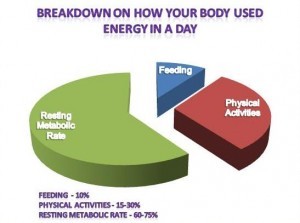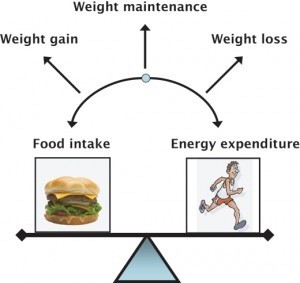Have you ever heard a conversation regarding weight loss go something like this 'I have a slow metabolism so it's harder for me to lose weight'? Or conversely 'I can't gain weight because I have a fast metabolism'. If you've made efforts to lose weight yourself, or work in the health & fitness industry, no doubt you've heard such a conversation. And it makes sense. If our metabolism is the sum-total of all the reactions occurring in the body i.e. anabolism + catabolism, than a faster metabolism should burn calories and a slower one less. Well James Krieger, one of the presenters at our Okanagan Strength & Conditioning Conference, gave a great presentation on the fact that metabolism is not as important in determining who is lean and who is obese or overweight. Krieger was able to present evidence that our metabolism is not the gatekeeper with respect to our level of leanness. [caption id="attachment_5135" align="aligncenter" width="300"] Where your body expends calories. In the pie chart above we see that over the course of a day we spend energy in three different ways including our metabolism (60-75%), the food we eat (10%) and through our physical activity (15-30%). We already mentioned that our metabolism, or RMR in the pie chart, doesn't account for how lean we are. When he looked at feeding, also known as the thermic effect of feeding, Krieger presented that while there is a difference in the amount of energy we expend to eat protein compared to carbs and fats this wasn't enough of a value to account for the difference in leanness. So this left physical activity as the only possible contributor to how lean someone is or isn't. [caption id="attachment_5136" align="aligncenter" width="300"] Physical activity can be broken down into exercise and Non-Exercise Activity Thermogenesis (NEAT). And there were a...
How the body burns calories
- Chris Collins
- Nutrition Advice
- 1720 Hits
- 1 Comment
-
In the last post I talked about the fact that for optimal health and weight loss we can't simply worry about reducing our sugar intake. As well, we can't simply focus on creating a caloric deficit. Both of these need to be addressed in order for healthy weight loss to occur. [caption id="attachment_4093" align="alignleft" width="300"] A caloric deficit is necessary for weight loss. Because here's the thing...we can all find examples of people who have lost weight on a diet consisting of poor quality nutrition. If you want to read the story of the science teacher who lost 37 pounds in three months eating only McDonalds click here. No one is disputing the fact that creating a caloric deficit will lead to weight loss. But does weight loss always equate to better health? Can you lose weight and become unhealthier in the process? Sure it's easy. Just eat McDonalds every day for 3 months. At the same time if all we are concerned with is reducing our sugar intake we may improve our health as evidenced by having some blood work done however we may lose much less than 37 pounds in 3 months. From the previous post we established that it's not an either-or scenario. We need to reduce our sugar and our calories. We need to worry about our mass and our health. But let's just look at weight loss for the time being. How do we attack weight loss? Well we need to create a caloric deficit. In other words we need to expend more calories than we consume. And as we already mentioned numerous times on this blog our sugar and overall caloric consumption is constantly increasing. And it seems unlikely that any of us are going to find a 25th hour in the day and begin...

